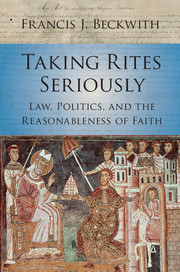Book contents
- Frontmatter
- Dedication
- Contents
- Acknowledgments
- 1 Introduction: Faith Seeking Understanding
- Part I Reason and Motive
- Part II Dignity and Personhood
- 4 Dignity Never Been Photographed: Bioethics, Policy, and Steven Pinker's Materialism
- 5 Personhood, Prenatal Life, and Religious Belief
- Part III Nature and Sex
- Index
5 - Personhood, Prenatal Life, and Religious Belief
from Part II - Dignity and Personhood
Published online by Cambridge University Press: 05 November 2015
- Frontmatter
- Dedication
- Contents
- Acknowledgments
- 1 Introduction: Faith Seeking Understanding
- Part I Reason and Motive
- Part II Dignity and Personhood
- 4 Dignity Never Been Photographed: Bioethics, Policy, and Steven Pinker's Materialism
- 5 Personhood, Prenatal Life, and Religious Belief
- Part III Nature and Sex
- Index
Summary
Today there exists a great multitude of weak and defenceless human beings, unborn children in particular, whose fundamental right to life is being trampled upon. If, at the end of the last century, the Church could not be silent about the injustices of those times, still less can she be silent today, when the social injustices of the past, unfortunately not yet overcome, are being compounded in many regions of the world by still more grievous forms of injustice and oppression, even if these are being presented as elements of progress in view of a new world order.
St. Pope John Paul II (1920–2005)My suggestion, then, is that we accord the life of a fetus no greater value than the life of a nonhuman animal at a similar level of rationality, self-consciousness, awareness, capacity to feel, etc. Since no fetus is a person, no fetus has the same claim to life as a person. We have yet to consider at what point the fetus is likely to become capable of feeling pain. For now it will be enough to say that until that capacity exists, an abortion terminates an existence that is of no “intrinsic” value at all.
Peter Singer (1946–)The political and legal disputes over embryonic stem cell research, cloning, and abortion are some of the most contentious in public life. But, as I noted in both the introduction and Chapter 2, the question that any resolution to these disputes must address – when does a human being become a subject of moral concern? – is sometimes assessed in a way that suggests that the prolife answer to this question – that a human being is a moral subject from conception or soon thereafter – is a religious one and thus not a deliverance of rational argument. In this chapter I show that this is a mistake, and that its advocates seem to confuse a position that is tightly tethered to a theological tradition with a position incapable of being supported by rational argument. Why they make this mistake is unclear, although I suspect that it has more to do with commonly held, although rarely questioned, beliefs about the positions held by religious citizens rather than a charitable and careful assessment of the actual grounds on which the religious citizens hold the positions they do.
- Type
- Chapter
- Information
- Taking Rites SeriouslyLaw, Politics, and the Reasonableness of Faith, pp. 105 - 136Publisher: Cambridge University PressPrint publication year: 2015



